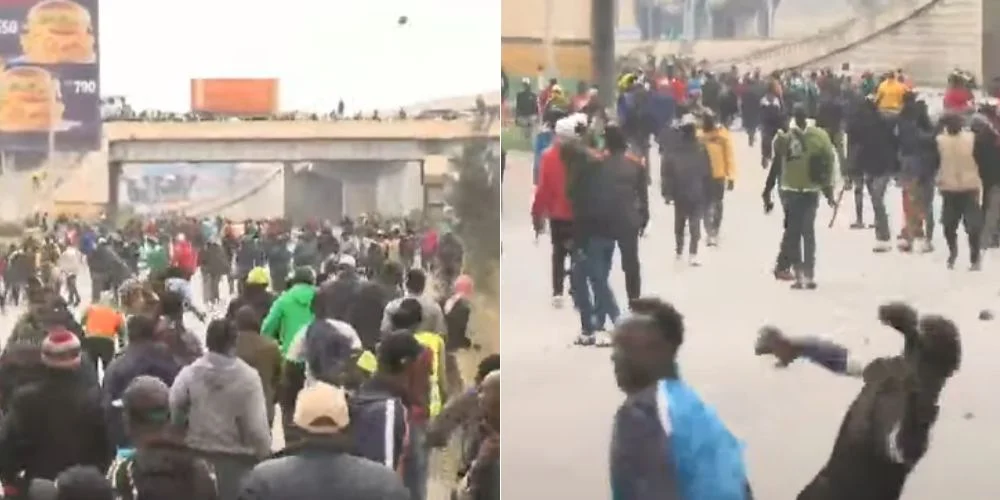
Violence erupted in Nairobi on Thursday afternoon when a group of youths pelted former Deputy President Rigathi Gachagua’s convoy with stones along Mombasa Road, near City Cabanas. The attack, which left several vehicles damaged and journalists’ equipment destroyed, unfolded as Gachagua was making his way from Jomo Kenyatta International Airport (JKIA) to Nairobi’s Central Business District (CBD).
The convoy, which was initially met with jubilant crowds at the airport, soon encountered chaos as unidentified assailants, many of them riding boda bodas (motorcycles), began throwing missiles at the vehicles in the procession. Among those targeted were media teams, including Cape Media’s TV 47, whose cameras and broadcasting equipment were severely damaged in the attack.
The incident also saw pedestrians and motorists in the area caught in the mayhem. Several personal items, including mobile phones and wallets, were reported stolen as the attackers took advantage of the chaos. Eyewitnesses described scenes of confusion as people scattered for safety, while others helped injured bystanders.
Despite the alarming situation, Gachagua and his security team took charge, attempting to navigate through the chaos and regain control. However, by late afternoon, the convoy was still stuck, unable to continue its journey through the congested traffic. At least two people are believed to have sustained injuries, although no fatalities were reported by the police.
A political analyst, Dr. James Ouma, suggested that the attack could be an extension of the heightened political tensions in the country. “Given the current political climate, with many opposing the government’s handling of certain issues, this could very well be a demonstration of growing discontent. The youth, often at the forefront of such protests, may have been reacting to perceived government failures or broader grievances.”
Gachagua’s arrival in Nairobi had initially been a celebratory occasion. He was greeted by supporters and political allies at the airport, where he donned a cowboy hat and a denim outfit, engaging with the crowd in a jovial manner. However, the festive atmosphere quickly turned grim as the convoy made its way through Nairobi’s busy roads.
The chaos echoes similar incidents of political unrest in the country, where road processions by prominent figures have often sparked violence. Earlier this year, several political rallies across the country were marred by violence, particularly in opposition strongholds, highlighting the fragile political stability Kenya faces.
Security forces have launched an investigation into the incident, but no arrests have been made yet. There are conflicting reports on whether the youths were part of an organized group or simply acting on their own. However, the use of boda bodas suggests the possibility of a well-coordinated action, as these motorcycles are commonly used in street protests.
Meanwhile, political figures have reacted strongly to the attack, with some calling for greater security measures during such high-profile events. Others have condemned the violence, citing the need for peaceful demonstrations and dialogue. “The actions today do not represent the voice of the Kenyan people,” said a statement from a political coalition supporting Gachagua. “We call on the authorities to swiftly bring the perpetrators to justice.”
The incident also brings into sharp focus the growing divide in Kenyan politics, as the nation remains polarized after the last elections. While the government continues to push for its economic agenda, including infrastructure projects, segments of the population remain dissatisfied with the pace of change and the impact on their livelihoods.
As of now, Gachagua has not made an official statement on the incident, but his supporters have expressed concern for his safety and condemned the violence. The police are working to piece together evidence and have urged anyone with information to come forward.
